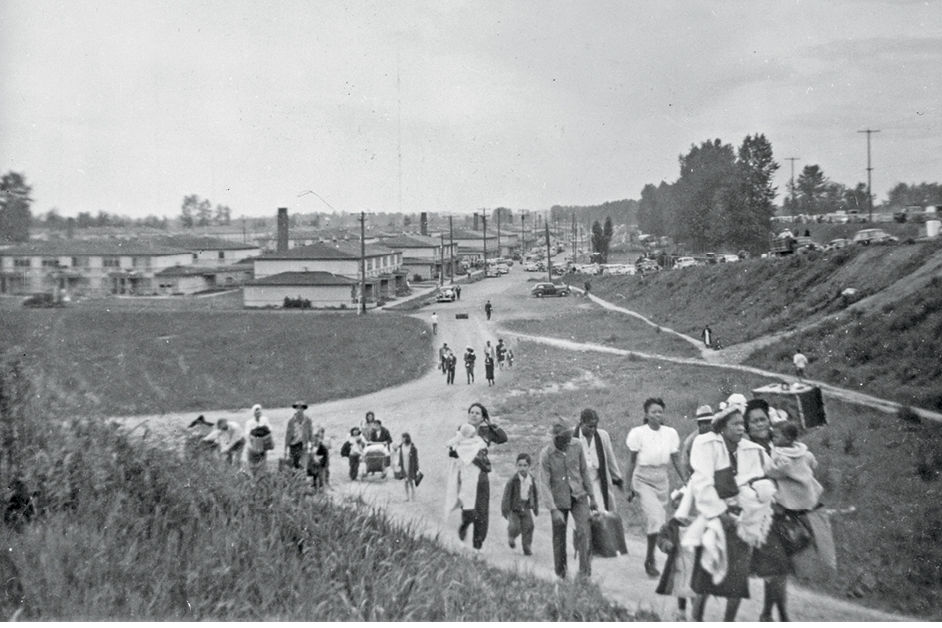How Portland Center Stage Is Refreshing Rent

Members of the cast of Rent at Portland Center Stage, L-R: Ashley Song, Will Wilhelm, Johnny Newcomb, Jeremiah Alsop, Benjamin Tissell, Kailey Rhodes, Nyla Sostre, and Delphon "DJ" Curtis Jr.
There are a handful of musicals non-theaterfolk have relationships with just by virtue of leading lives on planet earth. Knowing every word to Wicked does not require one to have a favorite Kander and Ebb deep cut; even jocks have aunts who brought them to The Phantom of the Opera when the national tour blew through town.
The quintessential “I’m not into musicals, but” property might be Rent, Jonathan Larson’s 1996 riff on Puccini’s La Boheme which transposed that classic opera to Manhattan’s Lower East Side in the midst of the AIDS crisis. The Pulitzer-and-Tony-winning smash spawned a show choir staple with “Seasons of Love,” and the 2005 film adaptation cemented it in the minds of viewers too young to catch the hype during its twelve-year Broadway run.
Chicago actor Jeremiah Alsop came by Rent through both avenues. In sixth grade, he landed a “Seasons of Love” solo at his middle school in North Carolina, and remembers telling his parents he planned to catch the movie on FX in preparation. “They were so upset,” Alsop recalls. “They were like, ‘No, no, no, you are not watching that. It’s all about gay people and celebrating these things we don’t believe in.’ So that night I secretly downloaded to my iPod anyway, and I watched it, loved it, and just cried in my room.”
During the pandemic, Alsop took a step away from performing. He hasn’t been in a show since “social distancing” entered the lexicon, and in the meantime, landed a job managing a dispensary. On June 1, though, that hiatus will end when he begins his run playing Mark Cohen in Portland Center Stage’s production of Rent.
Producing Rent in 2022 can feel a little ridiculous. How much freshness is there to wring, really, from a show steeped in ’90s alt-rock whose 20th anniversary was met with a series of unflattering think pieces about its creakiness? One that Fox deemed middle-of-the-road enough to give an ill-fated live TV treatment? Well—a lot, PCS hopes, especially in a moment of cultural upheaval that has further squeezed the sorts of artists and social outcasts that Jonathan Larson sought to champion on the Broadway stage 26 years ago.
“I don’t want to be like, ‘It’s a Rent you’ve never seen before!’ But it’s also super special,” says PCS literary manager Kamilah Bush, who worked as a dramaturg on Rent. Bush, like Alsop, fell in love with the movie as a southern teenager, and relished the opportunity to approach a well-trod piece of theater with fresh investigative eyes.
Her job, she says, was not to reinvent the wheel so much as give flesh to aspects of the material that might feel calcified a couple decades on. She started her research by thumbing through some of Larson's letters, and did deep dives into AIDS advocacy orgs like ACT UP, but mostly, she and the creative team relied on the simple urgency of the text to shake off any dust Rent may have accumulated since the Clinton years.
"There's this special thing about what Jonathan Larson did: he was talking about society at large, but he was really just talking about the people that he knew," Bush says. "And if you tell the truth, no matter when you tell it, somebody's going to be like, 'Yep, that's true.' That found family, that 'We are going to take care of each other because nobody else is looking out for us' thing, that 'I love you so much that I will set my scripts and posters on fire to keep you warm'; that's never gonna change."
Locating those truths, Alsop says, took up significant chunks of rehearsal time. "We spent the first week digging into every scene and our preconceived notions that we were projecting, and then we took all of that away to look at it fresh," he says, pointing, for example, to late act one number "Over the Moon," a parodic performance art piece that's often played for laughs. "This is a story about struggling people who are losing their home, who are dying, everyone around them is dying, the government isn't listening, and 'Over the Moon' is the start of a protest. It's the beginning of a riot that literally sets a Christmas tree on fire and gets the police involved, and [director] Chip [Miller] has not shied away from the serious notes of the show. I think people will see this, and it will make them go, 'Oh. Oh yeah. That's what this is about.'"
For all its contemporary resonances, though, Rent was written under a distinct social paradigm. And unlike, say, My Fair Lady, which is so antique it's basically alien, the show addresses recognizable groups and issues with a sometimes-clunky hand. It is, after all, a show about queer and trans artists—many of color, many with HIV—written by a straight, white, HIV-negative composer. Angel, a trans character, gets referred to with ever-shifting pronouns throughout the show, and a lot of other language that comes from ostensibly left-leaning characters will likely feel blunt to a progressive 2022 audience.
"There were conversations about it, for sure. But instead of being like, 'Should we change this,' it's like, 'Well, no, this is what the piece is,'" Alsop says. "These people aren't PC. These are who we think of as liberal, and they are sharing their thoughts, but they're saying what they feel. The thought of censoring that felt dishonest to the team."
Dovetailing conveniently with PCS's production is a small resurgence of Jonathan Larson love in pop culture. In February, British actor Andrew Garfield landed an Academy Award nomination for playing Larson in Tick, Tick... Boom!, a musical that dramatizes his artistic wind-up to Rent. (PCS will open their 2022–23 season with the stage version of Tick, Tick... Boom!.) And yes, cheesy as it may seem, putting up Rent—a show about government neglect and financial struggle which features a houseless ensemble that regularly addresses the audience—in the choppy waters of contemporary Portland has some real thrust.
Alsop acknowledges all of this. And then, reflecting on the effects of the process, strikes a more personal note that slices right through any jaded reservations about Rent's relevance.
"Screaming 'faggots, lezzies, dykes,' is so liberating," Alsop says, laughing. (He, along with the rest of the company, does this in raucous act one closer "La Vie Boheme.") "It's such a thing of the time, but these words used to make me cry—I used to let people make me feel so bad about all of this—and now here we are, 26 years later, and my parents were right. It is celebrating gay people. It is celebrating all those things we didn't quote-unquote 'believe in.' And I'm so glad that's still happening. I hope that in five, ten years, people are still screaming 'faggots, lezzies, dykes,' and celebrating that."
Rent
June 1–July 10 | Portland Center Stage, $25–85




